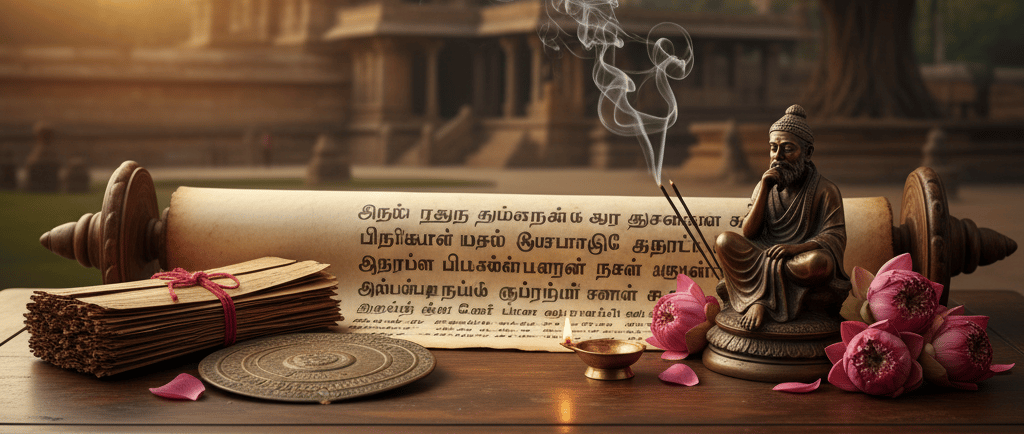Tamil Philosophical Traditions: Ancient Lessons for Modern Problems
In a world facing rapid technological change, social unrest, and environmental crisis, ancient wisdom can offer surprising clarity. The rich Tamil philosophical traditions provide timeless lessons grounded in deep reflection on life, ethics, nature, and society—offering insight that resonates just as powerfully today as it did thousands of years ago.
NON-STOIC PHILOSOPHIES
8/24/20252 min read


What Are Tamil Philosophical Traditions?
The Tamil philosophical heritage dates back to the Sangam period (circa 3rd century BCE to 5th century CE), characterized by a vast collection of poetry and ethical treatises that reflect a unique naturalism and pragmatism.
Unlike many ancient philosophies, Tamil thought initially rooted itself not in mythology or supernatural authority, but in nature, landscapes, and human experience. The land was divided into five distinct ecological zones or thinai—mountains, forests, rivers, coasts, and deserts—each corresponding to specific human occupations, emotions, and ethical codes.
This connection between environment and human life formed a kind of proto-materialism or naturalism, creating a philosophy where ethics and culture emerged organically from lived realities rather than imposed doctrines.
Key Philosophical Concepts in Tamil Thought
Ethics as Practical Living: Tamil writings such as the Tirukkuṟaḷ, one of the most important ethical texts, emphasize universal virtues like honesty, compassion, and self-control without strict ties to any religion. This ethical pragmatism asserts that practical behavior in daily life is the seat of morality.
Balance of Experience and Detachment: Tamil epics explore life as a balance between enjoying worldly experiences and gradually detaching through ethical conduct—reflecting an understanding of karma as actions and consequences grounded in this life, rather than mystical rewards or punishments.
Synthesis of Material and Spiritual: The Tamil worldview harmonizes material existence with spirituality, neither rejecting physical life nor divorcing it from higher moral ideals. This dialectical thinking blends naturalism with ethical idealism in an integrated way.
How Tamil Philosophy Helps Solve Modern Problems
Environmental Awareness: The original Tamil thinai concept teaches a profound respect for nature and sustainable living. In an era of climate breakdown, understanding humanity’s intimate connection with local ecosystems remains urgent and instructive.
Ethical Universality Beyond Religion: Tamil ethics, particularly from works like Tirukkuṟaḷ, transcend religious boundaries and focus on virtues accessible to all. In our pluralistic society, this offers a blueprint for shared values and peaceful coexistence.
Mental Wellbeing and Balance: The integration of enjoying life fully while practicing ethical detachment can inform modern mental health strategies—helping people face stress, attachment, and ethical dilemmas with equanimity.
Pragmatism and Resilience: Tamil philosophical pragmatism equips us to live ethically in complex, changing societies, emphasizing action rooted in experience and reflection rather than dogma.
Why Tamil Philosophy Is Relevant Today
While many ancient philosophies remain abstract or doctrinal, Tamil traditions are close to the ground of human life and social realities. Their holistic approach, combining naturalism, ethics, and spirituality, offers lessons for navigating modern social, environmental, and personal challenges in practical, inclusive, and sustainable ways.
Key Points
Tamil philosophical traditions date back over two millennia with unique naturalism and ethical pragmatism.
The thinai system links human life deeply with ecological environments.
Texts like the Tirukkuṟaḷ emphasize universal virtues beyond religion.
These philosophies offer solutions for environmental sustainability, ethical coexistence, resilience, and mental wellbeing in today’s world.
Final Thoughts
Tamil philosophical traditions remind us that ancient wisdom can illuminate the way forward. By grounding ethics in nature and daily experience, Tamil thinkers created a resilient, inclusive philosophy—one that continues to inspire practical, compassionate approaches to the problems of modern life.
Embracing these ancient lessons could help us craft a future that honors both our shared humanity and the living world that sustains us.
Waste no more time arguing about what a good man should be. Be one - Marcus Aurelius
We suffer more often in imagination than in reality - Seneca
Wealth consists not in having great possessions, but in having few wants - Epictetus
